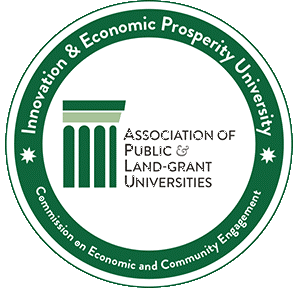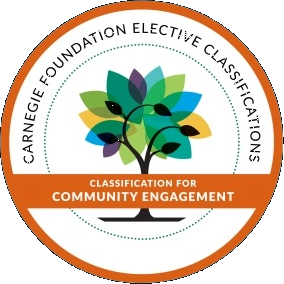October 25-28, 2020
2020 Assessment Institute Community Engagement Sessions
Registration deadline: October 12, 2020
Monday, October 25 - Wednesday, October 28, 2020
11:00 a.m – 6:00 p.m. Eastern
This following series of select concurrent sessions about community engagement is offered by the Indiana University and Purdue University Indianapolis (IUPUI) Assessment Institute. The 2020 Assessment Institute is being held virtually with complimentary registration to all members of the higher education community.
Session Descriptions
Actionable Assessment that also Demonstrates the Value of Higher Education: Learning from What Institutions are Doing
Policymakers, accreditation bodies, students and their families, and other stakeholders increasingly press institutions of higher education to provide clear evidence of their value. Community engagement is one response to this call to contribute to the public good. But what do we really know about the impacts of engagement? Does our assessment of community engagement support informed decision-making and our value proposition? Based upon an analysis of successful applications from the 2015 cycle of the Carnegie’s Community Engagement Classification, this keynote challenges prevailing assumptions about what we claim and what we know about the impact of community engagement.
Presenter: Valerie Holton, National Yang-Ming University
Presentation Type: 60-Minute Keynote Session
Are We On the Same Page? Examining the Health of Relationships Between Community Partners and Universities
Relationships evolve, including those between universities and the community partners for internships, service learning, volunteerism, and more. Are the partnerships beneficial for all parties and have they evolved to maintain relevance within the local community and university community? How can they be improved? This session will share information from interviews done with community partners related to the value they see in partnerships, their perspective on their identity as co-educators to students, and the perceived level of reciprocity and commitment. We will also ask audience members to share ideas on how they collect and honor “community partner voice” in their work.
Presenters: Laurie A. Marks, University of Wisconsin-Milwaukee; and Hannah Lubar, Marquette University
Presentation Type: 60-Minute Concurrent Session
Examining Alumni Engagement: What Institutions Can Do To Increase Depth and Breadth of Community Impact
We interviewed alumni to better understand how they see themselves contributing to the greater good of society 3-5 years after graduation. Of the 72 alumni interviewed, we learned about what topics are of greatest interests to them, how they are working to address social issues, and how their experiences during college influenced their engagement today. Attendees will hear from the institutional research team’s survey findings and how the community engagement staff are using the information from both the survey and the interviews to inform practice.
Presenters: Kristin Norris and Robbie Janik, IUPUI
Presentation Type: 60-Minute Concurrent Session
Outcomes from an Institution-Wide Community Engagement Framework: Comparing Perspectives Across Student, Faculty, and Community Partners
This presentation outlines the development of open-source tools to collect annual data about community engagement efforts from faculty and staff, students, and community partners at the University of Delaware. Early results from the tool application will be presented. Findings offer new insights into community engagement assessment and analysis, across and within stakeholder groups.
Presenters: Allison Karpyn, Kathleen McCallops, Tara Tracy, and Henry Wolgast, University of Delaware
Presentation Type: 60-Minute Concurrent Session
Rewarding Faculty for Community Engaged Scholarship: Policy Briefs as a Resource for Catalyzing Change
According to the latest faculty survey data from the Higher Education Research Institute (HERI), nearly half of all faculty members now indicate that they “collaborated with the local community on research/teaching to address their needs” within the last three years. Faculty reward policies, however, have not changed in ways that fully value and fairly reward the scholars who do community engaged scholarship. For campuses working toward making policy revisions, key questions emerge that are addressed in four policy briefs written for the Scholars Strategy Network (www.scholars.org). Presenters will share these four policy briefs that synthesize research on community engaged scholarship and engage in discussion on best practices for recruiting and retaining community engaged scholars on our campuses.
Presenters: John Saltmarsh and Gene Corbin, University of Massachusetts Boston
Presentation Type: 60-Minute Concurrent Session
The Means and the End: Assessing Undergraduate Digital Literacy
The ability to use technology effectively to communicate, manage, and lead public service organizations is increasingly crucial for students. Digital literacy is widely understood as essential to success in the workplace and modern life, yet this competency can be sorely lacking in nonprofit organizations. Our main research question was to determine the extent to which this undergraduate nonprofit course supported the improvement of students' digital literacy. We will share the course goals and objectives, assignments, measurement tools, and results. The evidence demonstrates the active learning exercises used in this course successfully improved students’ digital literacy.
Presenter: Alicia I. Schatteman, Northern Illinois University
Presentation Type: 20-Minute Concurrent Session
The Rarest Emerging Assessment Professional: Community Engagement Unicorns Unite
Come view for yourself the rarest of assessment professionals- unicorns if you will: The few of us that focus almost exclusively on assessing higher education's public mission, aka community or civic engagement. The lead presenter will begin by drawing connections between community engagement, higher education, and the role of assessment in both of those fields. Then panelists will discuss and attendees will learn about the rise of their role at their campus- how they work with campus leaders to inform policies and practices, how you too can advocate for an assessment professional in your division or unit focused on community engagement, and how these new emerging professionals are changing the landscape about "what counts" when it comes to informing or improving higher education's public mission(s).
Presenters: Anne Weiss, Purdue University; Jillian Martin, Washington University - St. Louis; Laura Nygaard, Texas A&M-San Antonio; Kristin Norris, IUPUI; Jo Wong, Stanford University; Christine Bruckner, Illinois State University; and Sherri Sklarwitz, Tufts University
Presentation Type: 60-Minute Concurrent Session
Think Win-Win: Service Learning for Pharmacy Students
Accreditation Council on Pharmacy Education (ACPE) 2016 standards for pharmacy programs specify service learning as a potential co-curricular tool to develop student skills in areas such as communication, advocacy, and professionalism while reinforcing didactic content. Additionally, service learning, particularly in rural communities, enhances community health, filling in care gaps. The impact of service learning on both community health and health professional learning necessitates a robust assessment strategy. The design, implementation, and integration of a service-learning assessment plan at a rural, private college of pharmacy will be described. Data, lessons learned, and best practices will be shared with participants.
Presenter: Michelle Musser, Ohio Northern University
Presentation Type: 60-Minute Concurrent Session
Two Paths Diverged: Equity Minded Community-Based Learning in Two Interdisciplinary Programs
How do we build equity-minded community-based learning experiences for students? As part of a grant-funded initiative creating and assessing equity-focused high-impact practices, two academic programs assessed access to and learning within their community-based-learning (CBL) courses. Representatives from both programs and the director of the Center for Teaching and Learning will help session participants consider how to engage their colleagues in 1) difficult conversations about assessing for equity in HIPs, such as community-based learning, 2) data-driven and research-based approaches to curricular and course development that integrate HIPs/CBL, and 3) the development of assessment plans and instruments whose results may help promote equity-minded change within programs.
Presenters: Kerry Kuenzi, Caroline Boswell, and Alison Staudinger, University of Wisconsin-Green Bay
Presentation Type: 60-Minute Concurrent Session
Fee
Free to all members of the higher education community.









